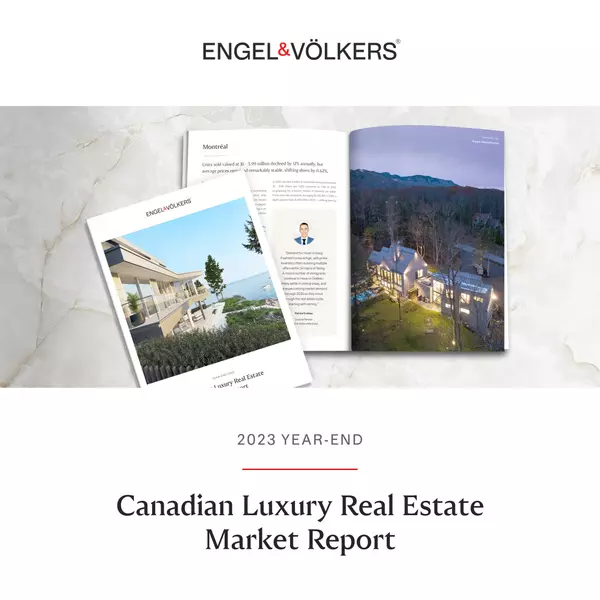2022 Year-End Canadian Luxury Real Estate Market Report

Engel & Völkers is excited to share our 2022 Year-End Canadian Luxury Real Estate Market Report. This report combines market data with intel from Engel & Völkers’ local Canadian market experts. The result is a residential property analysis covering the markets in Halifax, Montréal, Ottawa, Toronto, and Vancouver. The report shares insights on what’s happening inside Canada’s top real estate markets, including notable trends, in-demand neighborhoods, economic factors, and changing buyer and seller preferences in two different price segments: $1-$3.99 million and over $4 million. This year’s analysis shows sales volume in the Canadian luxury market holding, despite a national drop in the conventional market.
Click here to access the full report.
SPECIAL STATEMENT ON THE FOREIGN BUYER BAN
On January 1, 2023, The Prohibition on the Purchase of Residential Property by Non-Canadians Act, known as the foreign buyer ban, took effect. This measure will be in effect for two years and is intended to slow housing price growth and curb demand, helping build Canada’s real estate inventory.
Since the introduction of the policy, it has become abundantly clear that Canadian markets are already experiencing results intended by this ban. Non-residents represent less than four percent of residential property owners in most parts of Canada, including Ontario and British Columbia. Since 2020, demand in Canada has been overwhelmingly local. While global buyers certainly do have an impact on the Canadian market, Canada’s housing supply problem is not primarily driven by international buyers. Therefore, the possible impact of the ban remains unclear.
For international buyers seeking to purchase real estate in Canada, it is important to work with real estate advisors who are well-versed in the policies and exemptions of the foreign buyer ban and other tax measures placed on non-residents on a provincial basis. You may want to consider obtaining your own legal counsel regarding how to navigate this new policy.
MARKETS AT A GLANCE
Halifax

Annual sales volume of homes priced over $1 million reaches 4.6% in 2022, up from 2.6% in 2021.
Compared to other major Canadian cities, Halifax is among the most affordable. Following a period of significant home value increases, it has seen minor price movement in the $1 – 3.99 million segment and conventional markets in 2022. Unlike other metropolitan markets, the average sold price in the $1 – 3.99 million range during the third and fourth quarters was higher than the first two quarters despite two of the largest interest rate hikes occurring in this period.
Through the remainder of 2022, the average sold price for properties in the $1 – 3.99 million segment fluctuated between $1.25 million and $1.35 million before landing at $1,171,714 in December, a 21 percent decrease from the annual high of $1,481,725 across all property types in November.
“While some are waiting to see where the market will land, buyers can relax as properties are selling close to the list price. Sellers are willing to work with buyers to negotiate deals and conditions. Inventory is still low compared to demand; therefore, new buyers can purchase with confidence as prices are stable.”
Donna Harding, License Partner, Engel & Völkers Nova Scotia
After two years of accelerated prices and demand, sellers are now willing to work with buyers and accept conditional offers. The market has balanced with 4.8 months of inventory available in the $1 – 3.99 million range at year’s end as buyers and sellers wait to see how conditions develop. Engel & Völkers predicts the HRM may see increased demand in the spring once the interest rate hike cycle comes to an end, especially as the region expects an influx of new residents with five large onshore wind farms scheduled to begin operation by 2025.
Montréal

Prices hold in $1 – 3.99 million range as sales volume drops 55% from the first half of the year.
In the second half of the year, Montréal’s real estate market continued to gradually balance. In Toronto and Vancouver, $1 million represents the cost of a starter single-family detached home. This is not the case in Montréal, where this price point is largely comprised of ultra-luxury buyers, not first-time or second-time buyers. As such, interest rate hikes’ effects were more muted in Montréal as compared to other major Canadian cities. With a disconnect between buyer and seller expectations, the summer market was challenging. However, the market returned to typical patterns in the fall.
While demand for resale condos is still high from first-time homebuyers looking to enter the market, new construction has seen demand taper off. New construction is typically attractive to investors who are not seeing the same return on investment due to the interest rate hikes. Even with the decrease in demand, new construction is still booming in the Montréal area—compared to Toronto and Vancouver, developers are not as easily spooked by a slower pre-sale cycle as historically it would take three years to sell 80 percent of the units in a project.
In the $1 – 3.99 million segment, the average sold price for condos and residential class properties hovered around $1.43 million throughout the entire year. At year-end, the average sold price in this range was $1,552,346 for condos, an annual high for the year, and $1,524,821 for residential class properties, a two percent decrease from the peak in September.
The watch-and-wait holding pattern that defined much of the second half of 2022 will come to an end as buyers and sellers adjust to new market conditions. As Montréal’s market stabilizes, it’s essential to accurately price a property rather than intentionally underpricing to elicit a bidding war. Sellers should expect their properties to spend more days on the market as was typical pre-COVID. While Engel & Völkers is predicting a five percent dip in prices, the sales volume will remain similar to previous years.
Ottawa

Sales volume for homes priced over $1 million was the only segment that grew year-over-year, now 12% of the market compared to 9% in 2021.
Following two years of accelerating demand and steep price climbs, Ottawa’s market continued along the plateau established in the first half of the year. The market has balanced rapidly and total sales volume is the lowest it has been in the last eight years, down by 25 percent from 2021. However, the $1 million-plus market bucked the trend as the only price segment to see growth in 2022 with the total sales volume up 8.6 percent year-over-year. Sales over $1 million represented 11.7 percent of all transactions this year.
As intended, interest rate hikes blunted price escalation. The region was previously attractive to buyers cashing in from more expensive markets such as Toronto and Vancouver. However, as interest rate hikes have affected the value of their current homes, this practice is less lucrative than before. Still, prices are holding as 20,000 to 25,000 new residents move to the region each year. The market is balanced, approaching buyer’s market conditions as inventory piles up with new listings exceeding sales volume.
“While some are waiting to see where the market will land, buyers can relax as properties are selling close to the list price. Sellers are willing to work with buyers to negotiate deals and conditions. Inventory is still low compared to demand; therefore, new buyers can purchase with confidence as prices are stable.”
John King, License Partner, Engel & Völkers Ottawa Central
At year’s end, the average sold price was $1,271,748 in the $1 – 3.99 million range, down eight percent from the annual high in August. Engel & Völkers expects the average price and the overall sales volume to decrease by five percent from last year. Buyers may lose leverage by mid-March as the sharp impact of the interest rate hike cycle wears off. Once buyers and sellers adjust to the new market, the sales volume and the average sold price will see typical gains of about five percent each year. As prices level off across the region, suburban and semi-rural regions will continue to see price decreases more rapidly than urban and semi-urban neighbourhoods.
Toronto

2022 sales volume of condos priced between $1 – 3.99 million up 71% from 2020, but down by 18% from 2021.
Toronto’s market has started to level off after experiencing significant growth in recent years. Even as the market normalizes due to interest rate hikes, the impact is muted by insufficient supply. As one of the fastest-growing cities in North America, demand for real estate is constant. With an uptick in new construction cancellations, the Greater Toronto Area will feel this lack of new supply in the years to come.
At the end of 2023, the average sold price is $1,533,421 in the $1 – 3.99 million range, down three percent from the annual high in February and $4,999,637 in the $4 million-plus bracket, down 15 percent from the peak in May.
“With rising interest rates, the Toronto market has shifted from the frenetic pace we’ve seen in the last number of years to a more balanced market. Homebuyers are in a better position to negotiate as they are competing with fewer offers, especially in the $1 – 3.99 million range.”
Anita Springate-Renaud, License Partner, Engel & Völkers Toronto Central
The Bank of Canada is nearing the end of its interest rate hike cycle, which has successfully mitigated housing price growth. The success of interest rate hikes renders the impending foreign buyer ban unnecessary as Canadian markets are already going through the process intended by this ban. The ban fails to address the core issue of constrained supply, which will be amplified by the approximately 500,000 new immigrants Canada expects to welcome each year through 2025. A large portion of these new immigrants is expected to settle in the GTA.
Vancouver

Sales of condos in $1 – 3.99 million range up 95% from 2021 with 62% occurring in the first half of the year.
Vancouver’s real estate market has entered a stalemate. Despite the plummeting sales volume and a consistent number of new listings helping to replenish the supply, prices are still creeping up. Demand remains largely domestic, with buyers interested in the region for its employment opportunities and amenities. While supply is no longer at an extreme low, it is still inadequate. Many of those who can wait to sell are opting to do so, worried about taking a loss as some buyers feel hesitant to make major financial decisions during global economic uncertainty. Move-up buyers are in a great position with the calmer pace and accumulating inventory. Conditional offers have returned after being off the table for the last few years. As some workplaces return to the hybrid model, areas with proximity to the city, such as Coquitlam, are of interest to homebuyers.
As 2022 came to an end, the market balanced with the average sold price for residential class properties in the $1 – 3.99 million segment continuing to trend down from its peak in the first quarter, landing at $1,739,172. The $4 million-plus segment saw the average sold price peak later in the year before settling on $5,260,546.
Engel & Völkers expects a robust spring market as interest rates stabilize, returning activity to a manageable pace. The foreign buyer ban began in January 2023 and will likely have little effect on the resale market as demand is largely local. As previous legislative attempts to drive down prices have failed in Vancouver, the government should consider supporting Canadians entering the housing market with new ownership models such as fractional ownership, shared equity ownership, partnerships, and community land trusts.
Explore the full version of the report here.
The post 2022 Year-End Canadian Luxury Real Estate Market Report appeared first on Engel & Völkers.
Categories
Recent Posts











